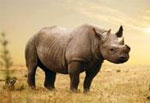Czech authorities announced on 24 July that an international gang had been importing rhino horns illegally into the Czech Republic, from where they were to be shipped to Asia for sale. According to reports the gang used bogus hunters to kill the animals in South Africa, who then applied for export/import permits to move the horns under the pretext of being personal trophies.
"This seizure shows just how big a problem wildlife trafficking is in the European Union," said IFAW EU regional director Sonja Van Tichelen. "Europol estimates global wildlife trafficking is worth €18-26 billion per year. If the EU is to stop the organised criminals involved in wildlife trafficking here in Europe it needs to do more to build law enforcement capacity in the countries where these endangered species live and are at risk."
International cooperation necessary to save the rhino
At least 448 rhinoceros have been poached in South Africa since January 2013. Since 2008 (according to the SA Department of Environmental Affairs) a total of 2142 rhino have been poached - from a total population of about 20,000 individuals. The South African government recently announced that it would apply for legal trade in rhino horn at the next meeting of the Convention in International Trade in Endangered Species (CITES) CoP (17).
"Illegal trade alone is nudging rhinos to extinction," said Kelvin Alie, director of the IFAW Wildlife Crime and Consumer Awareness Programme.
"The seizure of so many horns, and the arrest of so many people at one time, throws into stark reality the very real threat to rhino populations. Selling stockpiled horn might make financial sense in the short-term, but is naïve economic simplicity when one considers biological and animal welfare consequences. The South African government needs to think very carefully about the implications of their plans," said Alie.
IFAW congratulates Czech law enforcement authorities for their successful intervention of the gang and seizure of the contraband horn. Czech officials previously seized 10 rhino horns at Prague airport in March 2012.
"Only international cooperation between law enforcement authorities will end illegal wildlife trafficking," said Alie.
For more information, go to www.ifaw.org.






























